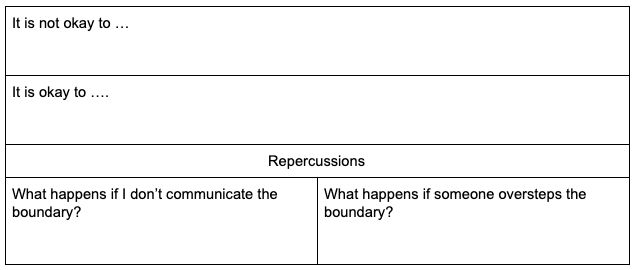
Setting Boundaries
What is okay? What is not okay?
Hello Reader,
Picture yourself skiing. You are at the top of the mountain, having just started down a run. You can see blue sky in every direction and there is fresh snow beneath you. You zip into a small copse of trees and then maneuver back onto the open slope. You speed by a bright orange sign that says ‘Boundary’ and whip through another bunch of evergreens. Woah. Woah. Woah. You throw on the brakes, stopping just before an almighty cliff.
On the mountain, a boundary indicates the end of the designated ski runs and the beginning of the wilder, more avalanche-prone, terrain. It is put there as a threshold, a limit, a perimeter to indicate where it is okay, and not okay, to ski.
What is a boundary?
Building off of this analogy, in human terms, a boundary is an invisible line which marks the difference between what is okay and what is not okay (Brown, 2018).
Why set boundaries?
Preserve Energy
A key reason I am learning about, and leaning into, boundaries is articulated beautifully by Siya Kolisi (Springbok Rugby Captain) in his autobiography.
Siya Kolisi
“I realised early on that I had to look after my own performance first and foremost. Being captain often involves looking outside yourself and considering the needs of other people … but sometimes you need to be selfish. … No rugby team can afford to carry a passenger.’ (Rise, 2021, p. 174).
This passage resonates powerfully with me. I want to serve others and my teams to the best of my ability, but if I don’t look after myself I won’t be able to - I will become a passenger or burnout. Boundaries are the means of conserving our energy and resources so that we can sustain our service to others.
Nullify Resentment in Relationships
I find resentment can build up like mold in my relationships. The more I feel I am giving of myself, my time, energy and resources, without receiving my expected compensation, the greater my bitterness and aggravation. I have come to realise, however, that the other person is often ‘taking advantage’ of me unwittingly - they don’t know they are overstepping. They are unaware of my brewing resentment.
Setting and sharing my boundaries helps nullify the resentment. The effect of communicating what is okay and not okay gives both myself and the other person a clear understanding of the expectations. We can establish a mutually satisfying give and take. Boundaries give us the opportunity for healthy, sustainable, relationships.
How to set a boundary?
1) Shape the Boundary
This first stage is a personal, internal exploration where you uncover, unpack and articulate the boundary you wish to set.
If you are struggling to identify where to start, think back to the times where you were angry, annoyed or resentful. These emotions often indicate situations where our boundaries (even if they are subconscious) were transgressed and/or where it could be useful to implement some limits.
I use the following framework to shape my boundaries:
2) Tell the Boundary to Other(s)
A boundary is only valid and useful once it has been shared with the relevant people. We cannot expect others to automatically know about it, so, take the time to make your expectation clear.
Explore these Assertiveness Tools if you would like more insight into communicating effectively and confidently.
3) Uphold the Boundary
The final step in setting boundaries is maintaining them. When someone trespasses on our boundary, we need to follow through with the repercussions. There is no getting around it, it is a huge challenge to uphold our boundaries, but remember, we established it for a reason and we have to lean into that.
‘Choose discomfort over resentment’.
This mantra is from Brene Brown and it summarises the mindset superbly. It is better to lean into the lesser discomfort now than to reap the greater repercussions later.
Examples
It is not okay to dump a big and impending work project on my plate at short notice. It is okay to give me a big work project if we have discussed it and I have enough time to complete it.
Repercussions: personal stress; poor quality work; resentment; anger.
It is not okay to expect me to spend the same amount of money as you on a holiday. It is okay to ask me about my budget for a holiday so that we can find a balance in terms of finances.
Repercussions: less engaged on holiday, anxious about money, stress, resentment.
It is not okay to barge into my room. It is okay to knock at the door and ask to come in.
Repercussions: anger, disrupt important work calls, loss of focus, disturb rest, annoyance, dislike, revenge.
As I have mentioned, none of this is easy. Boundaries are tough to create, tough to communicate and tough to uphold. It takes effort, hard work and grit, but the rewards are there for the taking.
Obstacles to Boundaries
Why do we find it so challenging to lean into our boundaries?
Guilt for Selfishness
When upholding our boundaries, it is easy to believe we are putting ourselves ahead of others, which can lead to feelings of guilt and self-reproach. The way I see it, though, there is a time to serve others and a time to serve ourselves. We need boundaries in place so that we can conserve our energy and are in turn able to serve others to the best of our abilities.
Discomfort in Conflict
I don’t know about you guys, but I find it uncomfortable and challenging to not acquiesce to the needs / demands of others. It is TOUGH to say ‘no’. I want to please, serve and be giving. In this situation, I lean into the mantra of Brene Brown, as mentioned above, ‘choose discomfort over resentment.’ If I don’t uphold my boundaries now, what will the repercussions be ...
Fear of Rejection
What happens if we don’t accommodate the wishes of the other person? Will they push us away? Will they get fed up and abandon us? These are natural thoughts, however, we have to remember that boundaries are not put in place to push people away. No, we are setting our boundaries so that we have the energy and mindset to be in a deeper, healthier and more sustainable relationship with them. Tell them this - the boundary is in place so that we can have the best possible relationship. One that lasts a lifetime!
Helping Young Professionals and Postgraduate Students Improve



